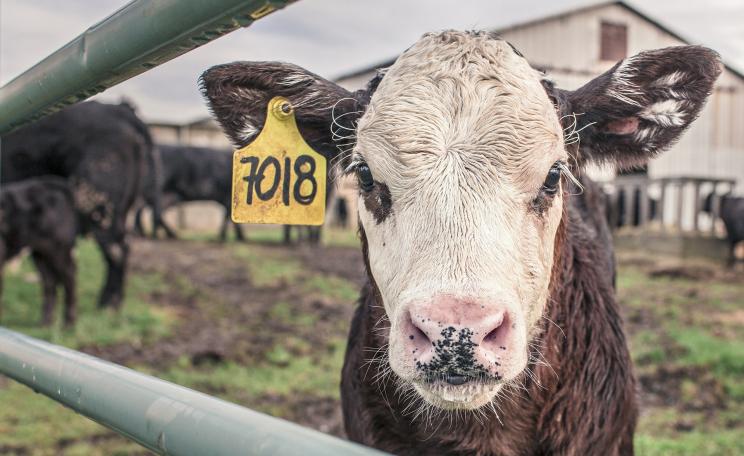Every time we sit down to eat a meal, we have the decision to shape our future.
‘There’s a monster in my kitchen, and I don’t know what to do.’
A new short film from Greenpeace highlights the devastating relationship between the global industrialised meat industry and rainforest destruction.
This comes as a follow-up to the popular 2018 ‘Rang-Tan’ video, which told the story of the impacts of palm oil production on the Indonesian rainforests.
Soya
Rang-Tan, a 90 second clip, became an internet sensation after the UK’s advertising approval agency banned it from TV screens, as it was considered too political.
But banning the clip perhaps only amplified the message, as palm oil continues to stay high on the environmental agenda.
While sustainable palm oil remains a noble cause, the most recent data available shows that palm oil accounts for only ten percent of the total European Union deforestation footprint, whereas nearly 50 percent can be attributed to soya imports.
Hence, soya production is directly responsible for nearly five times more deforestation than palm oil.
The large majority of soy imports into the UK are in the form of soya meal – its primary purpose being animal feed.
Hero
In fact, meeting the UK’s huge demand for soya requires nearly 1.5 million hectares of land, an area larger than Northern Ireland.
More than 70 percent of imports come from countries in South America where the mass cultivation of soya is driving deforestation, species extinction and wildfires.
The recent animation from Greenpeace also comes as a response to a new analysis of the latest fire data from Brazil’s National Institute for Space Research, which suggests that an area comparable to the size of the UK has burned across Brazil this year.
This is where our new hero – Jag-Wah – enters the scene.
Jag-Wah
Every time we sit down to eat a meal, we have the decision to shape our future.
The new film begins with a child searching the fridge for a snack in the middle of the night, when in enters a ‘monster’ – Jag-Wah – with an important message about food choices and deforestation.
Dramatic animations initially depict the Jag-Wah as the ‘monster in the kitchen’, however the message is quickly flipped when the character’s narrative begins.
"There’s a monster in my forest, and I don’t know what to do. It turned my home to ash, to instead grow something new.
Feed for chickens, pigs and cows – to sell more meat to you. As our forest disappeared, and their evil empire grew.
Biodiverse
They think that they’re unstoppable, but we pray this isn’t true. The real cost of what they’re doing, if only the whole world knew."
Huge swathes of rainforest are destroyed each day for cattle grazing and soy plantations to feed farmed animals.
While this article focusses on soy production, it must be noted that cattle ranching is thought to be responsible for 80 percent of deforestation rates. The destruction of habitats leads to a plethora of both environmental and societal concerns.
The topic perhaps most prominent is the climate emergency. Changes in our natural world – largely driven by human interaction – have huge, perhaps irreversible consequences on the climate.
Biodiverse environments such as Amazon rainforests absorb carbon dioxide in the air and help to regulate global temperatures.
Forest
But we are soon to reach a ‘tipping point’, which describes a situation where the Amazon can no longer generate enough rain to sustain itself.
In this bleak future, billions of tones of carbon would be released into the atmosphere, causing unimaginable issues across the globe.
The rights of indigenous communities are also under constant threat – both from loss of homes and violence from illegal ranchers and loggers, and from the coronavirus pandemic itself.
These communities are often taught and led by their elders, and as noted by Bruna Rocha (lecturer in archaeology) in this article – “Every time an elder dies, a library is burnt”.
The last point to be made – but certainly not the last issue prevalent – is the ‘Jag-Wah’ itself. Greenpeace’s decision to use a jaguar as the new environmental hero was certainly no accident, as they are one of the species most affected by forest fires.
Power
Recent fires in the Pantanal region have put at least 600 jaguars – out of an estimated 2,000 in the area – in danger. Devastating footage from the aftermath show an environment decimated of life.
Thankfully, the new film provides a solution to the crisis.
"Oh Jag-Wah in my kitchen, now I do know what to do. We’ll eat more plants and veggies and we’ll swap meat for bean stew – or barbecue tofu! ... We’ll stop these deadly monsters, so our planet can renew."
The industrialised meat industry is one of the key players destroying this crucial environment, but it doesn’t have to be this way. Every time we sit down to eat a meal, we have the decision to shape our future.
The cumulative effects of billions of seemingly small choices hold a greater power and potential than these industry giants.
Choice
Interested in veganism and the environment?
You can learn more about The Vegan Society’s environmental campaigns and policy work on our website here: Grow Green, Plate Up for the Planet and Climate Emergency.
The choice begins with you.
This Author
Louisianna Waring is the Insight and Commercial Policy officer at The Vegan Society. She has a background in both food policy and animal science and is passionate about animal rights. To learn more about The Vegan Society you can visit our website, Instagram and Twitter.







